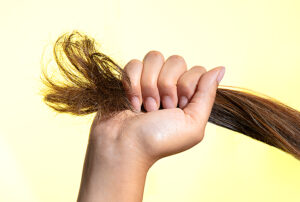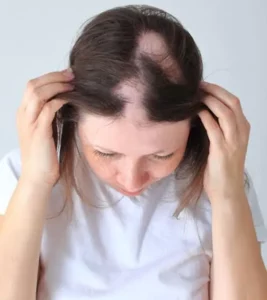For as long as people have been talking, there have been rumours of a link between trichotillomania (TTM) and obsessive-compulsive disorder (OCD). But is there really a link? And if so, is it strong enough to call them twin disorders? In this blog post, we’ll explore the theory behind a possible link between the two conditions. We’ll also look at some research that has been conducted on the matter and offer some tips for those who think they may be struggling with both TTM and OCD. If you’re curious about whether or not a link exists between TTM and OCD, read on to learn more.
Contents
What is Trichotillomania?

Trichotillomania is a mental illness that is characterized by an obsessive and compulsive urge to pull out hair. It affects nearly 2 million Americans, making it the most common hair-pulling disorder. Trichotillomania often co-occurs with OCD, which is a mental illness that involves obsessions and compulsions. Although the causes of trichotillomania and OCD remain unknown, it is thought that they share some underlying causes.
People with trichotillomania often have trouble controlling their impulses. They may feel a strong emotional or impulse drive to pull out hair, which often leads them to perform the behaviour even when it is harmful or embarrassing. They may also experience intense sensations on their scalp whenever they pull out hair, which can lead to compulsive behaviour.
OCD can involve recurrent thoughts or images that are intrusive and difficult to ignore. People with OCD may be worried about contamination or having evil thoughts, for example. They may also have repeated obsessions or compulsions related to those thoughts or images. The compulsion can be so strong that it becomes a problem in daily life. For example, someone with OCD might need to constantly wash their hands because they fear they will spread germs.
What Are The Symptoms Of Trichotillomania?
There is no definitive answer to this question, as the signs and symptoms of trichotillomania vary greatly from person to person. However, some common signs and symptoms of trichotillomania include:
- Habitual hair pulling or tugging;
- Difficulty controlling hair pulling;
- Repetitive body movements, such as head-nodding or shoulder shrugging;
- Diminished self-esteem due to hair loss;
- Anxiety or depression.
It is important to note that not all people with trichotillomania experience all of these symptoms. Moreover, some people with trichotillomania may never exhibit any signs or symptoms at all.
Trichotillomania is a disorder characterized by an obsession with pulling out one’s own hair. This behaviour can be extremely distressing for those who suffer from it, as it results in significant hair loss over time. In fact, according to the National Institute of Mental Health (NIMH), up to 30% of individuals with trichotillomania have permanent hair loss as a result of their disorder.
People with trichotillomania typically begin experiencing the signs and symptoms of the disorder in adolescence or early adulthood. However, the condition can also be triggered by other stressors in life, such as personal trauma or financial hardship.
Does Everyone With Trichotillomania Have OCD?
 There is a large body of evidence that trichotillomania and OCD are related. In fact, many experts believe that they are one and the same condition.
There is a large body of evidence that trichotillomania and OCD are related. In fact, many experts believe that they are one and the same condition.
The two conditions share many common features. Both involve repetitive behaviour that causes various problems. For example, people with trichotillomania may pull their hair out until it is thin and uneven. This can cause bald patches or stress fractures in the hair follicles, which can lead to scalp irritation and even skin rash. People with OCD may also experience excessive cleaning, checking, or order. They may become so preoccupied with details that they miss important assignments or events.
Both conditions can be difficult to treat. However, there are some things that might help alleviate some of the symptoms for both trichotillomania and OCD patients. For example, therapy that focuses on reducing unwanted behaviour or relieving underlying compulsions might be helpful for both conditions. Additionally, medications such as selective serotonin reuptake inhibitors (SSRIs) or antipsychotics might help to improve symptoms in specific cases.
Do Trichotillomania and OCD have a relationship?
There is growing evidence that trichotillomania and OCD may be related. Studies have shown that between 25-50% of individuals with trichotillomania also experience OCD. Additionally, people with OCD who have a history of trichotillomania are more than twice as likely to develop full-blown OCD disorder than those without a history of trichotillomania. This suggests that there may be a common underlying mechanism responsible for the development of both conditions.
One possible explanation for this relationship is that trichotillomania and OCD share some common features, such as obsessing about certain thoughts or behaviours, feeling compelled to perform the behaviour, and experiencing distress or negative consequences when the behaviour is not performed. It is also possible that trichotillomania and OCD share genetic factors, which could potentially lead to their development together.
Despite the growing evidence suggesting a relationship between these two conditions, it remains unclear exactly why they are related. Nevertheless, further research into this area could help to improve our understanding of both conditions and potentially pave the way for better treatment options for both individuals with trichotillomania and those with OCD.
Similarities Between Trichotillomania OCD
There are many similarities between trichotillomania (TTM) and OCD, which can make it difficult to determine if the two disorders are related. Both disorders involve a repetitive, intrusive thought or action that is difficult to control. TTM sufferers may pull out their hair repeatedly, while people with OCD may constantly worry about germs or contamination. People with TTM also experience significant distress and impairment in their lives, just as those with OCD do.
The causes of TTM and OCD are still unknown, but there is some evidence that suggests they may share a common genetic background. The two disorders also tend to occur together more often than they do alone, which suggests that there is something about them that links them closely. However, the causes of TTM and OCD are still unknown and scientists still don’t know if the two disorders are related solely because they share similar symptoms or if there is actually a shared cause behind them.
How Can Trichotillomania And OCD Be Treated?
 There is no one-size-fits-all answer to treating trichotillomania and OCD, as the treatments need to be tailored specifically to the individual. However, there are some general tips that may help.
There is no one-size-fits-all answer to treating trichotillomania and OCD, as the treatments need to be tailored specifically to the individual. However, there are some general tips that may help.
Some people find that cognitive behavioural therapy (CBT) is very helpful in reducing symptoms of trichotillomania. CBT involves working on changing negative thoughts and habits associated with trichotillomania. Additionally, some people find medications help treat their OCD symptoms. Medications can be used in combination with CBT or on their own. There are a variety of different types of medications available for treating OCD, and each person will respond differently to them. Some people also find self-help groups to be very helpful in managing their symptoms.
Conclusion
Tricotillomania and OCD are both conditions that involve repetitive, unwanted hair-pulling or obsessive thoughts about one’s hair. While it is still not clear whether trichotillomania and OCD are related, research suggests that they may share some common underlying causes. If you are experiencing any of the following symptoms associated with either condition, it may be worth seeking out professional help: extreme anxiety, stress, body image issues, trouble sleeping, poor concentration, and more.


